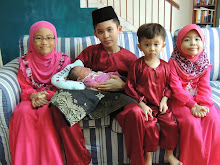
Emptiness...
| Truly in the heart there is a void that can not be removed except with the company of Allah. And in it there is a sadness that can not be removed except with the happiness of knowing Allah and being true to Him. And in it there is an emptiness that can not be filled except with love for Him and by turning to Him and always remembering Him. And if a person were given all of the world and what is in it, it would not fill this emptiness |
(Ibn al-Qayyim al-Jawziyy)
















